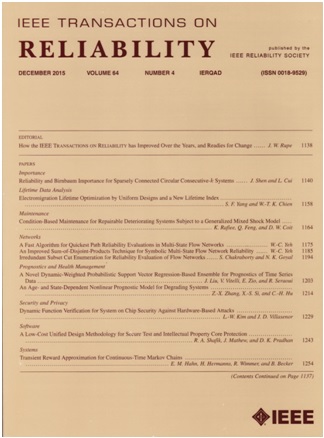基于恢复资源分配的相互依赖供应链网络对延迟级联故障的弹性增强
IF 5.7
2区 计算机科学
Q1 COMPUTER SCIENCE, HARDWARE & ARCHITECTURE
引用次数: 0
摘要
物理和网络供应网络之间日益增长的相互依赖性使得中断有可能引发结构故障和功能故障混合的级联故障。有研究提出了恢复策略,以提高相互依赖的供应链网络(ISCNs)的弹性。然而,他们很少考虑实际故障延迟时间和恢复资源分配对ISCN弹性的影响。本文首次提出了一个延迟-时间混合级联故障(MCF)模型来描述iscn中的中断传播过程。然后,在mcf作用下的iscn中实现了三种常见的基于边界节点的恢复策略,并基于有效的资源分配优化了网络节点的恢复顺序。最后,通过对现实供应链网络和三个人工网络的案例研究,从网络功能和网络结构的角度,使用基于弹性的两个指标来评估恢复策略的有效性。此外,研究了重要的可调参数对ISCN弹性的影响。实验结果表明,所提出的恢复策略优于传统的恢复策略。本研究为未来在有限恢复资源条件下提高ISCN弹性的投资决策提供了参考。本文章由计算机程序翻译,如有差异,请以英文原文为准。
Enhancing Resilience of Interdependent Supply Chain Networks Against Delay-Time Cascading Failures With Recovery Resource Allocation
The growing interdependency between physical and cyber-supply networks makes it possible for disruptions to trigger cascading failures with a mix of structure failures and function failures. There are studies that proposed recovery strategies to improve the resilience of interdependent supply chain networks (ISCNs). However, they hardly ever consider the impacts of real-world failure delay time and recovery resource allocation on ISCN resilience. In this article, a delay-time mixed cascading failure (MCF) model is first proposed to describe the disruption propagation process in ISCNs. Then, three common boundary node-based recovery strategies are implemented in ISCNs subject to MCFs, and the recovery sequence of network nodes is optimized based on efficient resource allocation. Finally, through case studies on a real-life supply chain network and three artificial networks, the effectiveness of recovery strategies is evaluated by using two resilience-based metrics from the perspectives of network function and network structure. Moreover, the impacts of important tunable parameters on ISCN resilience are examined. The experimental results demonstrate that the proposed recovery strategies are superior to traditional recovery strategies. This study provides insights for future investment decision-making toward the enhancement of ISCN resilience with limited recovery resources.
求助全文
通过发布文献求助,成功后即可免费获取论文全文。
去求助
来源期刊

IEEE Transactions on Reliability
工程技术-工程:电子与电气
CiteScore
12.20
自引率
8.50%
发文量
153
审稿时长
7.5 months
期刊介绍:
IEEE Transactions on Reliability is a refereed journal for the reliability and allied disciplines including, but not limited to, maintainability, physics of failure, life testing, prognostics, design and manufacture for reliability, reliability for systems of systems, network availability, mission success, warranty, safety, and various measures of effectiveness. Topics eligible for publication range from hardware to software, from materials to systems, from consumer and industrial devices to manufacturing plants, from individual items to networks, from techniques for making things better to ways of predicting and measuring behavior in the field. As an engineering subject that supports new and existing technologies, we constantly expand into new areas of the assurance sciences.
 求助内容:
求助内容: 应助结果提醒方式:
应助结果提醒方式:


